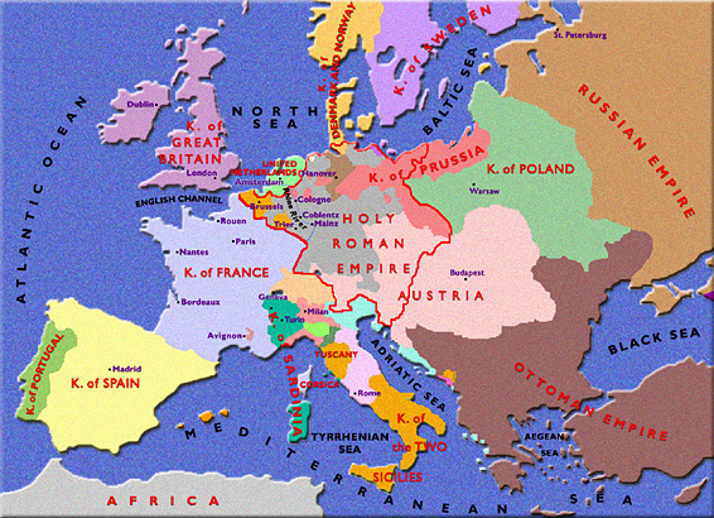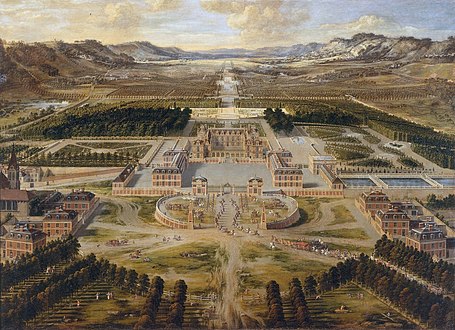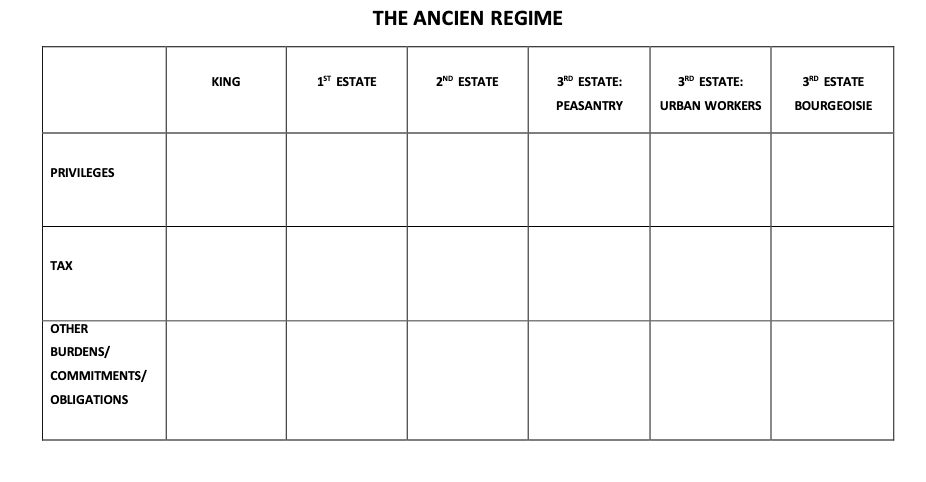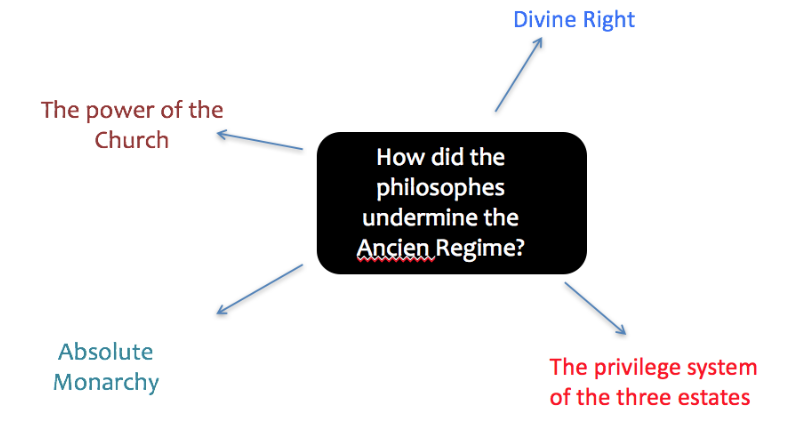1. Crisis of the Ancien Régime (ATL)
This section looks at the various threats and crises facing the Ancien Régime by 1788 and why this led to the calling of the Estates General in 1789 - an event which was to lead to the start of the revolution.
Guiding questions
What was Europe like in 1789?
What were the key stages of the Revolution?
What were the key features of the Ancien Régime?
Why was there a financial crisis by 1788?
How much of a threat to the Ancien Régime was Enlightenment?
How significant was the Revolt of the Nobles?
What was the economic situation of France in 1789?
what was France like on the eve of the Revolution?
1. What was Europe like in 1789?

A good starting point for this module is to get an idea of what Europe as a whole was like in the 18th Century; as you can see from the map above, the political borders of Europe were quite different to those of today. The main style of government in each country was monarchy.
Task One
ATL: Research skills
Research the ruler of each of the countries listed below in 1789 . Also research what type of government existed in each country and thus how much power the ruler had:
Austria
Great Britain
Russian Empire
Kingdom of Prussia
2. What were the key stages of the Revolution?
The events of the French Revolution are complex and keeping a hold on chronology is key so it's a good idea to start with an overview of the different stages of the revolution; refer to this timeline as you go through the course; the right-hand side of the time line is left blank so you can add more details as you go through this topic.
3. What were the key features of the Ancien Régime?
 Starter: This is a picture of the King of France's Palace of Versailles, built by Louis XIV. What does this indicate about the powers of the French monarch?
Starter: This is a picture of the King of France's Palace of Versailles, built by Louis XIV. What does this indicate about the powers of the French monarch?
This unit includes a lot of new vocabulary. it is a good idea therefore to download or copy out this glossary sheet at the start of the course so you can keep it in your folders and add to it as you go though the topic
The second sheet lists the key individuals and key groups of the French Revolution so you can keep a record of who is who!
 Glossary sheet of French Revolution to be completed by students
Glossary sheet of French Revolution to be completed by students
 Key individuals and groups of the French Revolution: to be filled in by students
Key individuals and groups of the French Revolution: to be filled in by students
The organisation and society in France before the revolution is known as the 'Ancien Régime '; it was a hierarchical system with the king at the top. His subjects were divided into three 'estates' and each estate had its own privileges and duties.
Task One
ATL: Research, thinking and self-management skills
1. Research further the three estates in France. Copy out and complete the grid below on the privileges and burdens of each of the three estates. Provide precise detail on the exact taxes and obligations etc for each estate.
These pages will help you in your research:
ER Services - Taxes and the Three estates
Alpha History: Taxation as a cause of revolution

Task Two
ATL: Thinking skills
1. Read the following source. Discuss in pairs the potential problems with such a system.
Taxes were collected by a chaotic and inefficient system known as tax farming. The Farmers-General was a company that collected the indirect taxes for the government; they paid the State an agreed sum and kept for themselves anything collected above this figure. In addition the taxes were collected by officials who, under a system known as venality, had bought the right to their positions and could not be dismissed.
2. Discuss in pairs the following question:
Why did the taxation system weaken the Crown? (see hint below for ideas on this)
- Burden fell mainly on poor (also indirect taxation) this also meant that the people who had money were not giving it to King
- Tax-farming - inefficient and State never received enough money form indirect taxes
- Corruption also meant that Crown did not receive all money it should have done from officials
Task Two
ATL: Research skills
Find out more about the personalities of the King and Queen of France at this time, and the palace where they spent much of their time - Versailles.
You should aim to find out 5 interesting facts about each of the following:
- Personality and actions of Marie Antoinette
- Personality and actions of King Louis XVI
- The building of Versailles
- Daily Life at Versailles
Keep to information before 1789
Write up these facts (with any interesting pictures) on 2 sides of A4/ US Letter paper.
This website from PBS (Public Broadcasting Services) will be useful for this task.
You will also get an idea of life at Versailles by watching the movie Marie-Antoinette by Sofia Coppola.
Although Louis was in theory an 'absolute monarch' who held his position, it was believed, due to 'divine right', he was not in fact an all-powerful ruler who could do exactly as he wished (a despot). He was expected to be a just ruler and to preserve various rights and privileges that had been established over the years. He was also expected to consult with the nobility. Thus, when a law was made, an 'edict' was drawn up by the King and his ministers and then sent to the Paris parlement (lawcourt) to be approved and registered as law. Although the king could enforce law by a system known as a 'lit de justice', it was clear that if the King used this method too frequently, it would cause resentment and undermine his power.
Task Three
ATL: Thinking skills
From what you have read above and researched in the tasks, consider in pairs the following questions:
How far was Louis XVI an 'absolute' monarch?
In what ways did the Ancien Régime strengthen his power? In what ways did it weaken his power?
Task Four
ATL: Thinking skills
One of the most interesting sources on life in France before the revolution comes from Arthur Young, an Englishman traveling around France. The full account of his journeys can be found here.
Watch the following video from 7 minutes to 14 minutes 40 seconds.
Make notes on other aspects of France on the eve of the Revolution.
Task Five
ATL: Thinking skills

What is the message of this cartoon from 1788?
Bibliothèque Nationale de France, c. 1788.
3. How much of a threat to the Ancien Régime was the Enlightenment?
One factor undermining the Ancien Régime was the Enlightenment. This was an intellectual movement that started in France in the middle of the 18th Century and which emphasised the importance of human reason in guiding government and society. The writers of the Enlightenment were known as the philosophes.
Task One
ATL: Thinking skills
Study this information about the Enlightenment.
Identify the key features of Enlightenment thought.
Task Two
ATL: Thinking and communication skills
1. Divide the class into groups. Each group should take one of the following philosophs and create a presentation to the rest of the class to show the key ideas of the philosoph.
- Montesquieu
- Voltaire
- Rousseau
- Diderot
(Two groups may also want to consider the ideas of Hobbes and Locke; although not French, their ideas had a big impact on the Enlightenment thinking of the time).
Alternatively, research the philosophs using the questions below.
Seventeenth Century Enlightenment
- What radical ideas did Hobbes have regarding the power of monarchs?
- Why did Locke believe that all people are equal?
- According to Locke, why do people enter into a ‘social contract’?
- What is the purpose of such a contract?
- When can this contract be broken?
Descartes
- What was Descartes’ obsession regarding philosophy?
- What was his most famous ‘truth’?
- How did his ideas challenge ‘traditional’ thinking?
The Philosophes
- Who were the philosophes? Give some examples of the French people who were part of this movement.
- What were the three main ideas of the philosophe movement?
- What were Voltaire’s views on religion?
- What did he believe should be the relationship between the secular side of the state and the religious side of the state?
- What was the point of the Encyclopedia?
- What did Montesquieu mean by a government that had ‘checks and balances’?
Jean-Jacques Rousseau
- What is the first sentence of Rousseau’s most famous work, ‘The Social Contract’?
- What do you think he meant by this?
- What kind of contract does Rousseau believe should exist between rulers and the ruled?
- What was the importance of these ideas?
2. The Ancien Régime was based on the ideas of Divine Right, the power of the Church, the inequality of the Three Estates and the concept of Absolute Monarchy
When all of the presentations have been heard (or you have completed the questions), brainstorm in pairs the ways in which Enlightenment ideas undermined these key features of the Ancien Régime.
Copy out and complete the mind map with your conclusions.

The following task involves students taking on a character from France in the 18th Century. They will have to think what their character would have been experiencing and thinking at 3 different points: before 1789, at the end of 1789 and during the Terror. They need to give a speech from their character's point of view to the rest of the class at each of these points in the revolution.
Task Four
ATL: Thinking and communication skills
You will be given a character from France in the 18th Century. You need to decide what position your character was in at three different points in the course of the French Revolution: before 1789, at the end of 1789 and during the Terror.
You will tell the rest of the class your thoughts about what is going on at these three times.
The attached sheet is to help you keep a record of your thoughts as you go through.
The different characters are:
- Lawyer (bourgeoisie) from a small town in France
- Poor peasant from the Vendée region (Very Catholic and conservative)
- Parisian worker - a sans-culottes – (very dependent on there being enough bread, and bread that is not too expensive)
- Poor clergyman
- Wealthy bishop
- Noble - enlightened, well read in Enlightenment thinkers
- Noble d’épée; large estates, spends most time at Versailles
- Marie Antoinette
- Louis XVI
- Soldier in French army from peasant background; has taken part in American War of Independence
- English visitor to France; has travelled around the country, been to Versailles etc.
These are some hints for each character to think about regarding their situation before 1789:
Character | What do you have? | What do you not have? |
Bishop | Tax exemption chose what to pay, privileges, own courts | Political power |
Priest | Tax exemption, power over people, own courts | A reasonable income, most of tithe income sent upwards, because of plurality |
Court Noble | Tax exemptions, access to high office, feudal dues, seigniorial rights | Political power on a regular basis, depends on King’s will |
Provincial noble | As above, but no access to high office, unless rich enough to buy it | Political power or access |
A lawyer | A good education and career | Exemption from taxes Political power, any privileges under the law |
Merchant | A business, money | Exemption from taxes, pay large amount of tax but no say in how this money is spent |
Urban worker in Paris | Work (if times are good) | Enough to survive on, (mention growing price of bread), any security, have to pay many taxes |
Soldier in the army | A job | Any way of advancement, cannot be an officer; you experience all other taxes and burdens of 3rd estate |
Peasant farm worker | Work if times are good | Enough to survive on when times are hard because of taxes, tithe and feudal dues. You are subject to many feudal laws. |
 French Revolution character sheet
French Revolution character sheet
4. Why was there a financial crisis by 1788?
Starter:
What can you learn from this table regarding the state of royal finances by 1788
 Royal income and expenditure 1788 (millions of livres)
Royal income and expenditure 1788 (millions of livres)
From France in Revolution, Dylan Rees, Hodder
Although Enlightenment ideas were taking hold in France and, indeed, those who had fought in the American War of Independence returned to France imbued with enlightenment ideas, it is unlikely that, without the impetus of a financial crisis in France by the 1780s, a revolution would have occurred. The revolution came about due to the King facing bankruptcy and from the the attempts by the various Controller Generals of Finance to tax the nobles.
During the 18th Century, France had fought a series of financially ruinous wars which had forced the Crown to take out loans which then meant high repayment debts. The immense debts incurred by France in its support for the American colonies between 1778 and 1783 were to precipitate the final financial crisis. The Controller-General, Necker had raised money for this effort by organising loans on behalf of the state. However in order to gain loans he concealed the true extent of the Crown's debts by publishing a series of accounts known as the Compte rendu which appeared to show that all was well. In fact these accounts excluded the massive debt repayments. The most significant result of this act was to make it very difficult for his successors to make financial reforms as Necker's evidence suggested that these were not necessary!
As you will have seen, the real problem remained the fact that the structure and privileges of the Ancien Régime prevented the land of the nobles being taxed; many wealthy merchants in the Third Estate would also often buy their way into the Second Estate to avoid paying taxes on their earnings.
A series of Controller-Generals of Finance tried to introduce various reforms; it was the failure of these reforms and the refusal of the nobles to agree to the much-needed changes which ironically started the revolutionary ball rolling.
Task Three
ATL: Self-management skills
1. Complete the attached grid to show the actions of the different Controller-Generals from 1783 in trying to solve the financial crisis. (Click on the eye for details on the Controller-Generals)
2. In pairs consider the following question, Why was it so hard to solve the financial crisis?
Necker
Necker was a Swiss banker whose appointment coincided with the War of American Independence; he tried to bring about a fundamental reform of the French taxation system. He cut expentditure and produced the first ever publication of royal accounts in 1781 (see above). The fact that this made it appear that there was a surplus of royal finances meant that lenders felt safe enough to lend money which allowed him to raise loans without having to create new taxes; this made him popular with the Third estate. However, the economic situtaion worsened; to make matters worse, the 1770s and 1780s saw a series of poor havests and since the population was rising the prices increased out of proportion to income. With less money to spend, people bought fewer manufactured goods which led to an increase in urban unemployment. All of this made it harder to collect taxes. Necker tried to control the level of war expediture but faced enemies at court and in 1781 he resigned.
Charles de Calonne
Charles de Calonne became Controller-General of France in 1783. Royal debts were steadily mounting but Louis and his ministers resisted change and so all he could do was attempt to get more loans which meant yet more payment on interest. However, 1784 - 85, the Paris Parlement refused to register futher loans and Calonne had to inform Louis that finanical collapse was imminent. He finally managed to persuade Louis that some form of radical change was necessary; he proposed that the twentieth tax would be replaced by a single land tax paid by all landowners including the clergy, in goods, rather than in money. Proposals were also made to stimulate the economy by removing internal customs barriers, abolishing the corvee and freeing trade in grain. As discussed above, Louis was not all-powerful and he did need to involve the nobles in some level of consultation and thus to gain their support. He thus decided to call an Assembly of Notables consisting of 144 members of the nobility. However the Assembly of Notables immediately attacked Calonne's proposals and insisted that an Estates General needed to be called to discuss such a radical plan. Calonne tried to appeal to the public behind the back of the Assembly but this provoked further criticism and led to Calonne's dismissal. The Parlements now led political opposition to any changes in taxation.
Archbishop de Brienne
Archbishop de Brienne took over from Calonne but he did nothing more than produce a slightly amended version of Calonne's plan which also failed; the assembly was thus dismissed in May. To stave off bankruptcy, Brienne had to take out new loans at a very hight rate of interest. He now tried to get the tax reform throught the parlement directly but the Paris Parlement said it lacked the authority to sanction this change. (See the grid below for details on what happened next)
 Grid to complete on Louis XVI's Controller Generals
Grid to complete on Louis XVI's Controller Generals
6. How significant was the Revolt of the Nobles?
The first stage of the revolution involved the nobles and indeed it is somewhat ironical that it was at their insistence that the Estates General was called, which of course led to the revolutionary events of 1789.

Cartoon from 1787 showing the nobles at the Assembly of Notables shown as birds. Calonne (the Monkey) asks them what sauce they would like to be eaten with.
Starter activity
What is the message of this cartoon from 1787?
Hint: Would they like to be eaten at all?! How is this linked to the paying of tax?
As you will have seen in the completion of your grid above, in Feburary 1787 Calonne decided to call an Assembly of Notables in order to make the necessary changes in the tax system without having to go through the Paris Parlement. The Assembly of Notables included some of the most powerful representatives of the first two Estates, including the King's own relatives, the princes of the blood, and it was assumed that their support could be relied upon.
Task One
ATL: Thinking task
Read through the attached timeline which shows the rising tension following the failure of the Assembly of the Notables.
1. What was the role of each of the following in creating a situation where the Estates General had to be called?
- the King
- the Controller-Generals
- the parlements
- the financial crisis
2. What evidence is there in these events that the idea of the philosophes had influenced the thinking of the noblility?
3. The parlements claimed to be defending the rights of the people in calling for an Estates General. How accurate do you think that this claim was?
7. What was the economic situation in France in 1789?
Task One
ATL: Thinking and social skills
Read the following account of the French economy leading up to 1789.
Discuss in pairs the way in which economic and political factors are linked. Do you think that there would have been a revolution if there had been no economic crisis?
In the years preceding the revolutionary events of 1789, France had faced several bad harvests. In 1788, there was a particularly poor harvest following a wet spring and hailstones in many areas in July. This was disastrous for the peasants, but it also had a profound impact on the urban workers as it pushed up the price of bread. By the winter of 1788 - 89, workers were spending 88% of their daily wage on bread. With the high prices of food leading to less demand for manufactured goods, there was also an increase in unemployment in such areas as the textile industry. These desperate circumstances led to peasant disturbances in 1788. it also meant that the urban workers became more politicised and this increased expectations for the Estates General.

 IB Docs (2) Team
IB Docs (2) Team


